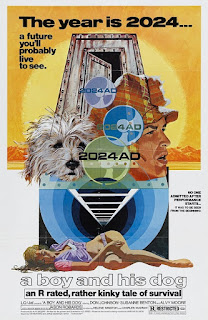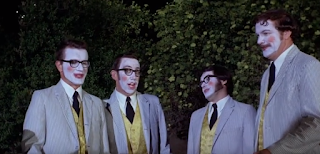Published: 1969
Film: 1975
15-year-old Vic is a survivor of World War IV. In this alternate world, dogs have achieved telepathic abilities, and Vic has teamed up with a dog named, Blood, arguably the smarter of the pair. Together, they scavenge the wasteland of the former United States. They search for food, shelter, and women for Vic. It is in this quest that they find a woman named Quilla June, who is out to lure Vic for her own purposes.
I'm doing things a little differently here, so anything beyond here may have spoilers!
Sexist Attitudes of the Protagonist and the Post Apocalyptic Wasteland
In the post-apocalyptic wasteland, it’s every man for themselves. Women are used for sex, and it’s not often that women are spotted. Vic grew up in this world, presumably without the proper guidance that we, today, give children. So, is not surprising that he is a product of more primal urges. The story is not framed in a way that gives the impression that Vic (or the author) think that what they are doing is moral, just that it is the new norm in that world. Women are commodities, just like food, shelter, and weapons. I point this out because I know there are large groups of readers who are more sensitive to these topics. I don’t believe it isn’t worth reading, even when it is, at times, difficult to read how badly the world has fallen.Unlikable Protagonist
Film Adaptation
Have an essay in university that you need to compare and contrast the original source material (novel, short story, etc.) with an adaption (comics, films, etc.)? Consider Ellison’s “A Boy and His Dog” and the 1975 film. Are you objective? Can you also write objectively? It couldn’t hurt to know how closed-minded your professor is, too. When I was in high school and 17-years-old, this would have been deemed outrageously inappropriate. But when I was in my first year of university and 17-years-old, nothing is deemed off-limits. The short story “A Boy and His Dog” is arguably not high school reading, but by the grace of being in university or college, a wider range of reading material is opened up to students who may still be teenagers. I am actually disappointed that I didn’t use this for one of my adaptation essays. I usually only write about homework with high school students in mind, specifically, but I thought I would throw some ideas out on the internet in case anyone needs some inspiration. Note: I don’t have access to a lot of English literary criticism databases anymore, so perhaps this is overdone to death. What I am interested in is how the film toned-down/dumbed-down the messages for the screen.
Decrease in Crude Language and Behaviour
I can see why the film version made him less crude and forceful with his interactions with women (though he does have quite the remark about the woman who was killed in the beginning of the film). Even in the 70s, I think it would have been hard to reveal on the screen that Vic had indeed, raped many women before, hurting them, leaving them in dangerous situations, and had zero regards for them as people. He was specifically trying to find Quilla for this purpose, but in the film, he softens quickly to her idea of being together forever (as long as Blood can come, too).
Quilla June: Book VS Film
What was disappointing to me is how obviously evil she is in the film. In the book, it’s ambiguous how the reader is definitely meant to feel about her. Vic’s ultimate decision brings an array of possible reactions/emotions: disgust, resignation, understanding, sadness.
In the film, she is a terrible person who is using Vic for her own agenda. So when it’s barbeque time, it’s difficult to have too many conflicting emotions about it. Blood would aggravate Vic, but Quilla is undeniably a detestable character. The film dumbed-down the whole conflict. This should have been the best aspect of the film and it turned it into, eww, cannibalism! No. The ending to the book is, “A boy loves his dog.” The film ends with Blood saying, “Well I'd say she certainly had marvellous judgement, Albert, if not particularly good taste.” Way to kill any kind of nuance.
Book Topeka vs Film Topeka
Topeka in the book is stated to be more religious, as they had kicked all the scientists out to establish their own rule. Other than that, it isn’t described in detail.
In the film, Topeka is an oligarchy that imitates the deep south in dress and morals. The townspeople are in whiteface with painted smiles and rosy cheeks. The film is also full of bright colours, and the atmosphere isn't described that way in the book (I got the feeling that it was dingy). They get rid of the people who don’t fit in by sentencing them to the farm, immediately (as in, where your parents tell you where your dog is because they are too cowardly to tell you Rover has died). While I find that the film Topeka is much more interesting, it is again portrayed in such a way to make the audience’s distaste for it obvious. Why do we assume that film audiences are stupid?
Book Topeka vs Film Topeka
 |
| You can look at your best friend and say, "To the farm, immediately" and have an in-joke. There, I just gave you a thing. |
Topeka in the book is stated to be more religious, as they had kicked all the scientists out to establish their own rule. Other than that, it isn’t described in detail.
Final Thoughts
Originally, I discovered this more than 10 years ago from the I Read Comics podcast by Lene Taylor. I can't see which episode specifically talks about it, though they are all great. I am indebted to her, not only for all those hours of entertainment, but for introducing me to more stories I would have never come across otherwise. She currently blogs at Look At His Butt! and that has it's own podcast (her voice is exceptional btw, go check her out).
I can't recall if it was her or a guest, who basically said, Well, it's not called A Boy and His Dog and His Girlfriend. And that sentiment has literally stayed with me and I've repeated it so many times I've lost count.
Update: Harlan Ellison's passing on June 27
Unfortunately, the author passed on June 27 in his sleep. He was writing another book in this series and a screenplay. Perhaps one day we'll get to enjoy the rest of his story.
Update: Harlan Ellison's passing on June 27
Unfortunately, the author passed on June 27 in his sleep. He was writing another book in this series and a screenplay. Perhaps one day we'll get to enjoy the rest of his story.








No comments:
Post a Comment